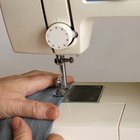
altrendo images/Stockbyte/Getty Images
According to experts at the University of Maine, effective communication can help build trust, share ideas and promote increased comprehension of issues and concepts. Speaking, writing and using body language are all key parts of communication, but listening and receiving information is also critical to effective communication. In order to creative effective dialogue, all parties must be able to express themselves clearly and listen for understanding.
Expression in Communication
According to the University of Colorado's Conflict Resource Consortium, or (CRC), all communication has a sender and a receiver. The sender has information he intends to express to the receiver, who must interpret the information. A variety of elements--including tone, body language and clarity of word choice--can affect the message. Expression of a message, either spoken or written, is a key aspect of successful communication.
Body Language
According to experts at the University of Maine, body language has a significant effect on communication. A facial expression or a gesture can change the meaning of words, and body language can both negatively and positively affect the outcome of a conversation. Closed body language--such as folded arms, avoidance of eye contact or angry facial expressions--can indicate anger or withdrawal. Open body language--such as eye contact, sitting forward or leaning toward someone and focusing on the conversation--can indicate investment in the communication.
Active Listening
Both the CRC and the University of Maine emphasize that listening plays a key role in effective communication. Without active and well-developed listening skills, the individual receiving information might misinterpret messages. Some key aspects of active listening are an open listening stance, with direct eye contact and focus on the conversation; verbal acknowledgment of key points, such as restating a point or asking a clarifying question; and being able to summarize the other person's points prior to responding. This helps both parties check for understanding and clarify any misunderstandings, which builds dialogue.
Creating Dialogue
The University of Maine defines dialogue as a meaningful two-way communication that allows people to communicate about topics of importance. In dialogue, participants express thoughts and ideas openly. All parties in a dialogue can listen to the other party's perspective, regardless of how different it might be, without a need to argue. Dialogue often leads people of different opinions to a better understanding of multiple perspectives on issues.
Assessing Communication Skills
According to the University of Maine, you should routinely assess your communication to ensure that all parties feel heard and to clarify any miscommunication. Consistently practice active listening skills, and consider your body language. As you become more aware of how others listen to you, you are likely to improve your own listening skills and body language. In turn, miscommunications and misinterpretations tend to occur less frequently, increasing the level of understanding and the quality of dialogue.
Related Articles

Effective Face-to-Face Communication

Five Benefits of Attentive Listening

Problems in Verbal Communication

What Is Verbal Communication?

How to Explain Something Clearly

Verbal Versus Nonverbal Communication

Characteristics of Good Listening Skills

Why Do We Need Effective Communication?

The Effects of Lack of Communication in ...

What Is the Meaning of Judgmental?

How to Communicate With a Passive ...

Banquet Planning Checklist

How to Stop AARP Mail

How to Write a Bible Study Lesson

Verbal Communication Tools

Barriers to Effective Verbal ...

How to Construct a Seamstress ...

How to Write an Invitation to a Public ...

What is Effective Communication?

Principles of Effective Communication ...
References
Writer Bio
Christy Bowles has 15 years of experience in the field of education, with 10 years working in mental health and wellness. She specializes in the treatment of depression, anxiety and substance abuse, with a focus on alternative treatment modalities. Bowles holds a Master of Education from Harvard University.
Photo Credits
altrendo images/Stockbyte/Getty Images